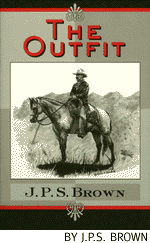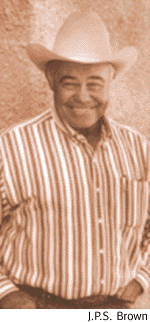

|

Kudos Or No, J.P.S. Brown Went On Writing 'Til The Cows Came Home.
By Sam Negri
The Outfit, by J.P.S. Brown (MQM Publishing). Paper,
$20.
J.P.S. BROWN IS a Tucson novelist who hasn't been getting his
share of respect in recent years, though he may be the quintessential
regional writer. Many writers tend to work on their personal myths
ad nauseam because it sells well and feels so good. Brown wrote
his novels and faded back into his first love like a man whose
ego needed fresh air and nothing more. And yet, few who write
about the landscape of southern Arizona have ever experienced
it the way Brown has--as a rancher, horseman, boxer, miner and
cattle buyer--or written about it with such compelling intimacy.
 Brown is known to his fans as the author of the Arizona Saga,
consisting of The Blooded Stock, The Horseman, Ladino,
and The Outfit. Brown's maternal grandparents had a homestead
called El Durazno, a ranch near Harshaw, and the Arizona Saga
is a fictionalized account of that family's history in the terrain
which anyone familiar with the Patagonia and Santa Rita Mountains
will easily recognize. There is hardly a single work of fiction
that evokes the natural and cultural landscape of southern Arizona
and northern Mexico as vividly as these four novels.
Brown is known to his fans as the author of the Arizona Saga,
consisting of The Blooded Stock, The Horseman, Ladino,
and The Outfit. Brown's maternal grandparents had a homestead
called El Durazno, a ranch near Harshaw, and the Arizona Saga
is a fictionalized account of that family's history in the terrain
which anyone familiar with the Patagonia and Santa Rita Mountains
will easily recognize. There is hardly a single work of fiction
that evokes the natural and cultural landscape of southern Arizona
and northern Mexico as vividly as these four novels.
All of his books have long been out of print and hard to find,
but last year The Outfit was re-issued by MQM Publishing,
a new Tucson company owned by a couple of his friends.
 Joseph Paul Summers Brown was born in Nogales, Arizona, in 1939,
a time when his mother Mildred Sorrells, and his father, Paul
Summers, were running the Rock Corral Ranch in the Tumacacori
Mountains. His parents later divorced and his mother married a
rancher and cattle buyer named Vivian Brown; but Joe kept his
biological father present in his two middle names.
Joseph Paul Summers Brown was born in Nogales, Arizona, in 1939,
a time when his mother Mildred Sorrells, and his father, Paul
Summers, were running the Rock Corral Ranch in the Tumacacori
Mountains. His parents later divorced and his mother married a
rancher and cattle buyer named Vivian Brown; but Joe kept his
biological father present in his two middle names.
Brown, though he looks the part of the vaquero from the tips
of his boots to the top of his ever-present black Stetson, is
not your standard gosh-and-golly cowpoke with a tin of Copenhagen
in his shirt pocket. When he was 9 years old, his parents sent
him away to a boarding school in Santa Fe; after graduation he
was sent to the University of Notre Dame. Even at Notre Dame,
he was a little unusual: During the school year he studied for
his degree in journalism, but he also turned into a champion boxer.
In the summers he returned to horses and cows, working the family's
Arizona ranch. Later he joined the Marines and worked at the Marine
Corps Cold Weather Training Center in California, teaching rock
climbing and animal packing during the summers and cold weather
combat and survival skills in the winters. When he was discharged
in 1958, he divided his time between Mexico and Arizona, selling
cattle raised south of the border.
For him, writing always seemed secondary to the business of experiencing
life. Most of his interests centered around horses and a desire
to remain independent, and those absorbed most of his energy until
1964. That year Brown fought five boxing matches in Mexico and
broke his right hand. Then he contracted hepatitis.
For the better part of a year he was sick and weak. Boxing was
out of the question, and his cattle business had fallen apart.
Brown was broke and living with his grandmother in Nogales when
he started writing the stories that became the picaresque novel
Jim Kane. He needed money, and there wasn't much he could
handle, physically, except writing. At the time he naively believed,
as many younger writers do, that the gap between writing and the
next payday would be short. He was going to raise money by writing.
"I had no strength. I made myself write two hours or 1,000
words every day. That was all with a pen or typewriter. I was
broke and the writing was an absolute and total necessity,"
he said. However, it was 1970 before Jim Kane was published.
Paul Newman eventually purchased the rights to the book from Dial
Press and turned it into the 1972 movie, Pocket Money,
which starred Newman and the late Lee Marvin.
Between 1971 and 1993, Brown wrote nine novels and a short story
collection in between stints trading cattle and horses, and running
his own ranch. In the middle of everything else, he became a union
wrangler and picked up jobs on Hollywood movies.
When The Blooded Stock came out in 1990, the Southwestern
bibliophile Lawrence Clark Powell placed it on a list of Best
Southwestern Books and wrote, "J.P.S. Brown could prove a
successor to Zane Grey and Louis L'Amour."
 "In his mind I'm sure that would be a compliment,"
Brown said, "and in my mind it wouldn't be. Zane Grey was
no cowboy, and I am a fifth generation cowboy."
"In his mind I'm sure that would be a compliment,"
Brown said, "and in my mind it wouldn't be. Zane Grey was
no cowboy, and I am a fifth generation cowboy."
A few years ago, when Brown had a ranch up near Payson, I spent
a day with him trying to track a stock-killing lion. Toward the
end of the day, as he let the horses out to pasture, he talked
about why he wrote about the cowboy's life.
"I write about it because it's what I know. What's good
about a cowboy is the care and risks you take, the solitude and
the beauty of the country you move in. It's about stamina and
perseverance and an ability to perform without any background
music or audience. A cowboy does his work 100 miles from anybody.
When we got over that hill up there today, you're out of sight
of everyone, and in there you do whatever is necessary without
applause. You're out there to husband your cattle and bring that
horse in as fresh as you can. That's what being a cowboy is. It's
not these stories that have been concocted by Zane Grey and Louis
L'Amour about how they always win their fist fights and they always
get the rancher's daughter, and all that nonsense."
Nevertheless, when Bantam released the four books of the Arizona
Saga in paper, the covers were plastered with dramatic kitsch--art
of sober, heavily armed stock western characters.
"I hate that stuff," Brown said, but he was smiling,
too. "Look at this one," he said, holding up a copy
of The Horseman. "This guy doesn't even know how to
hold a rifle!"
It was just the sort of thing few, if any, readers would notice...but
Brown knew, and that was bad enough.

|
 |





